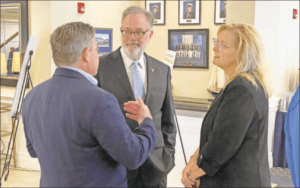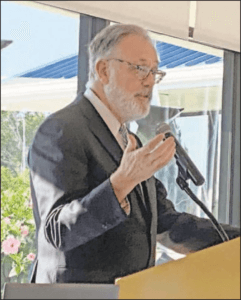Economist to Venice chamber: ‘Florida will be OK’
He says state is well positioned to ride out any economic waves this year.
This article was written by BOB MUDGE, Senior Writer, and featured in the Venice Gondolier on Saturday, April 20, 2024.
VENICE, FL — Though he’s skeptical interest rates will come down this year, economist Jerry Parrish said Floridians shouldn’t be too worried about the economy.
“Even as things slow down in other parts of the country, Florida is going to be OK,” he told the people attending the Venice Area Chamber of Commerce’s Economic Outlook Breakfast Friday.
Parrish, who’s now the chief economist for the Metro Atlanta Chamber of Commerce, has been the speaker at all six of the breakfasts the chamber has hosted about the economic outlook, Venice Area Chamber of Commerce President/CEO Kathy Lehner said.
He began by reminding everyone when he spoke last year, most economic prognosticators foresaw a mild recession in 2023.
The 10-year maturity rate on treasury yields was lower than the two-year rate, and that “yield curve inversion” had always been followed by a recession, he said.
“But it didn’t happen, did it?” he said.
Instead, the U.S. economy had one of its strongest years in a long time, and no one is predicting a recession now, he said.
However, there are economic issues that need to be dealt with, he said.
No. 1 is the national debt, which now stands at $34 trillion. That’s $100,000 for every person in the country and $200,000 for each wage earner, Parrish said.
Interest on the debt is about $1 trillion a year, he said, some of which is financed at low interests rates. But as those parts get paid off, interest expense will increase.
On the other hand, Florida’s debt has been steadily decreasing and is at interest rates so low it would be stupid to pay it off.
Parrish said he supports Federal Reserve Chair Jerome Powell’s effort to rein in inflation by keeping interest rates up.
“I would do the same thing,” he said. “You’ve got to kill inflation when you can. It’s a tax.”
Inflation has made everything more expensive, and not always in ways that are obvious, he said.
For example, he said, increases in the price of natural gas have contributed to higher electricity costs because 70% of the state’s power plants run on it.
Food prices are affected, too, he said, because nitrogen fertilizer comes from natural gas.
Lower-income earners have dealt with higher prices by relying more on credit cards, driving credit card debt more than $1 trillion, he said.
Auto debt is more than $1.5 trillion, and student loan debt is $1.74 trillion.
All three figures are dwarfed by the nation’s mortgage debt: $12.1 trillion.
The 30-year rate is just under 7% now, Parrish said, and that’s having an impact on the labor market. People are unwilling to sell a home with a lower interest rate to move and have to pay a higher one, he said.
All that debt will lead to more foreclosures and repossessions, he said, but not at the levels seen in the Great Recession of 2008.
Overall, he said, “people’s balance sheets are too good.”
Yet another issue is how to deal with the continuous influx of people into the state, Parrish said.
The net number of new residents — considering births, deaths and people moving in and out — is 793 people per day from 2011 through 2023. But it’s been more than 1,000 people per day for the last two years, he said.
With nearly 3.8 million more people, Florida is No. 2 in population growth, behind Texas, since 2010, and No. 4 in percentage of growth — 20% after Idaho, Utah and Texas, he said.
Idaho and Utah have seen an influx of people leaving high-tax California, he said, and Florida’s gaining people from New York, New Jersey, Connecticut, Ohio and Illinois for the same reason.
Sarasota County grew 23.4% in that same period, and the rate in Charlotte County was 28.9%.
But DeSoto County grew by only 3%, and 13 of the state’s 67 counties actually lost population, Parrish said. That’s a problem because as their tax base shrinks they become more dependent on the state for help.
Conversely, they might be more affordable places to live and commute from for people priced out of living close to where they work, he said.
SUN PHOTOS BY BOB MUDGE


